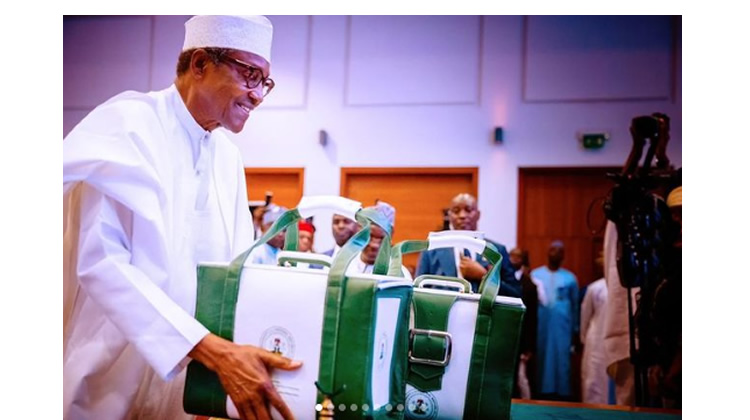By Leke Baiyewu and Tope Omogbolagun
The National Assembly on Thursday failed to pass the 2023 Appropriations bill as earlier scheduled.
Indications of this emerged when the budget report was not listed on the Order Paper for Thursday’s legislative activities.
Shortly after a closed-door session that lasted 15 minutes, the Senate President, Ahmad Lawan, said that due to irreconcilable figures detected by Appropriations committees of both chambers, the National Assembly would not be able to deliberate on the 2023 budget as earlier scheduled on Thursday.
Lawan said as a result of the long cleaning process the draft budget proposal underwent, Committees on Appropriations from both Chambers, couldn’t meet up with the submission of the report for consideration and passage today.
The Senate President, however, blamed the executive arm of government for submitting the budget proposal very late and when it was laid, it came with errors.
He also said that the process of cleaning the errors contained in the Appropriations bill was concluded yesterday adding that the two chambers have to harmonize the copy to be able to present the report for passage by both chambers on Wednesday 28th, 2022.
Lawan also assured that the implementation of the proposed budget will still commence on the 1st of January, 2023.
Lawan said, “Today was scheduled to be the day for us to receive and consider the report of our Committee on Appropriations on the 2023 Appropriation Bill. However, due to some challenges, we are not able to receive the report of the Committee.
“And the main reason for this is because the Appropriation Bill came to the National Assembly with some hurdles and when our Committees on Appropriation in the Senate and House started to reconcile the figures of what we have done and what was presented, the hurdles became obvious and they were not easy to deal with and therefore, our Committees had to start a process of cleaning up the Bill first.
“That process also engaged the Executive arm because the problem came from there. It was concluded only yesterday and our committee secretariat are not able to finish processing the Budget for us to take today because these are Christmas period.”
Lawan then added that the considerations for the 2023 Appropriation Bill would resume after the Christmas holiday on Wednesday, 28th December 2023.
He added, “We can only receive the report and consider it on Wednesday, December 28th. So far, this Ninth National Assembly has done so much to pass the previous Appropriations since 2019 before the end of the year.”
Speaker reacts
Meanwhile, the National Assembly has delayed the passage of the 2023 Appropriation Bill till next week.
Speaker of the House of Representatives, Femi Gbajabiamila, made it known at the close of plenary on Thursday.
Gbajabiamila said, “By the way, there should have been an announcement earlier; we were meant to close today but, unfortunately, work has to continue. There are some things that need to be done and we will adjourn today till Wednesday when we will pass the budget and close for the year.
“We were meant to close today but you know our work is a very tough one. We will come back on Wednesday. We will adjourn today and come back on Wednesday, just for that one item – pass the budget and the Finance Bill.”
President of the Senate, Ahmad Lawan; and Speaker of the House had at various times during the week indicated that the Federal Government budget would be passed on Thursday (today) when the lawmakers were expected to embark on Christmas and New Year break.
However, our correspondent had earlier observed that the House Committee on Appropriations would not lay its report on the money bill on Thursday.
Laying of the report was not listed on the Order Paper for the day.
Several lawmakers blamed the delay on the 2022 Finance Bill and Supplementary Appropriation Bill recently transmitted to the National Assembly for consideration and passage.
The President, Major General Muhammadu Buhari (retd.), had only on Wednesday transmitted the Finance Bill, while the supplementary budget was received by the parliament on Thursday.
With the development, there is uncertainty over the maintenance of the January-December budget cycle, which the current 9th National Assembly restored three years ago.
After the National Assembly passes and transmits the budget back to the Executive, the relevant ministries, especially the Ministry of Finance, Budget and National Planning, usually scrutinise the content before the president signs it into law, a process that sometimes takes weeks.
Meanwhile, the House has passed a budget of N262,959,510,955 for the Federal Inland Revenue Service in 2023.
The Committee on Finance, chaired by James Faleke, laid the report on Thursday, which the House considered and adopted as a Committee of the Supply.
The lawmakers approved issuance from the Statutory Revenue Fund of the FIRS, the total revenue of N262,959,510,955, out of which N126,070,912,538 is for Personnel Cost, while the sum of N96,061,565,065 is for Overhead Cost, and the sum of N40,827,033,352 is for Capital Expenditure for the service year ending December 2023.
Meanwhile, House, also on Thursday, urged the Central Bank of Nigeria and Deposit Money Banks to prevent the imminent deportation of many Nigerian students schooling in other countries due to the forex crisis.
A member of the House, Tolulope Akande-Sadipe, moved a motion of urgent public importance to raise the alarm over the inability of the students to process fees in the various academic institutions across the world.
Akande-Sadipe decried that the international students were having hard times processing payments provided by the beneficiaries.
She said top Nigerian banks had failed to process the transfers made to the schools to settle tuition, accommodation fees and other required expenses. She further decried that the banks had refused to refund the affected students to enable them search for alternative means of payments.
The lawmaker warned that the students are on the “verge of being deported to Nigeria if urgent action is not taken to remedy the situation,” adding that the CBN and commercial banks refused to come to their rescue.
Source: The Punch








